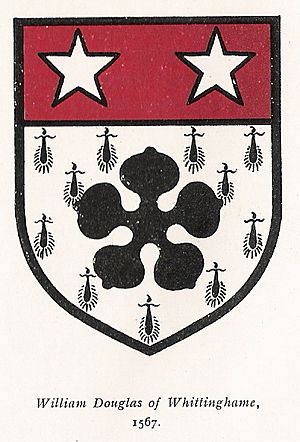William Douglas of Whittingehame facts for kids
William Douglas of Whittingehame (born around 1540, died in 1595) was an important person in Scottish history. He served as a judge in Scotland's highest court, the College of Justice in Edinburgh. He was also involved in many significant political events of his time.
Contents
Who Was William Douglas?
William Douglas was the oldest son of William Douglas of Whittingehame and Elizabeth Lauder. His family, the Douglases, had owned the Whittingehame estate in East Lothian for a very long time, even before the 1500s.
His Public Life
Early Career and Church Connections
After the Scottish Reformation (a big change in Scotland's church), William Douglas received land from the church in Whittingehame in 1560. This land included many acres and cottages.
He joined a group called the Lords of the Congregation, who supported the Protestant church. He often helped the General Assembly of the Church of Scotland talk with Mary, Queen of Scots and the Scottish government, known as the Privy Council of Scotland.
Involvement in Key Events
It's believed that important discussions about the future of Queen Mary's husband, Lord Darnley, happened at Whittinghame Castle in 1566. William Douglas was later linked to the death of David Riccio, a close advisor to Queen Mary. He received a pardon for this in December 1566.
In 1567, he joined a group that supported James VI, who later became King of Scotland.
Serving as a Judge
William Douglas became a judge (an Ordinary Lord) in the College of Justice before 1575. This was during the time when Regent Morton was in power, and Whittingehame became more successful.
In 1579, he and his brother Archibald were excused from court because Archibald was very ill.
Political Challenges
After Regent Morton lost power in 1581, William Douglas faced serious threats. He was questioned about the death of Lord Darnley, which was part of an effort to find Morton guilty. Douglas offered to share information if he was protected.
The English ambassador, Thomas Randolph, was disappointed because Douglas seemed to cooperate with the new leaders. Douglas even said that some letters he had brought from England, which spoke badly of Esmé Stewart, 1st Duke of Lennox, were fake and made by his brother. The information from Douglas and others led to Regent Morton's execution.
In 1582, William Douglas was named as one of the people involved in the Raid of Ruthven, an event where young King James VI was taken by force.
He left his judge position before 1590. His son, Archibald, then took over the role, even though these positions were not usually passed down through families.
Diplomatic Role
Records from his grandson, Robert Douglas, Count of Skenninge, suggest that William Douglas of Whittingehame might have been a Scottish representative (an envoy) to King Christian IV of Denmark and Norway around 1590. King James VI of Scotland married Christian IV's sister.
His Family Life
William Douglas married Elizabeth Maitland in 1566. She was the daughter of Sir Richard Maitland. They had six sons and two daughters.
Here are some of their children:
- Sir Archibald Douglas of Whittinghame: He also became a judge in the College of Justice. He died without children and left Whittingehame to his niece's husband, Sir Arthur Douglas.
- Patrick Douglas of Standingstone: His son, Robert Douglas, Count of Skenninge, became a famous military commander in Sweden during the Thirty Years War.
- James Douglas: He was described as a "secretary to James VI."
- Richard Douglas: He owned lands in Newgrange and Brockholes.
- Sir William Douglas of Stoneypath: His son-in-law, Sir Arthur Douglas, eventually inherited Whittingehame.
- Margaret Douglas: She married Robert Sinclair of Longformacus.
- Elizabeth Douglas: She married Samuel Cockburn of Templehall. Some people think she was the writer "E. D." who wrote poems to William Fowler, a poet and secretary to Anne of Denmark.
- John Douglas: He became a minister in Canonbie in 1606.
 | George Robert Carruthers |
 | Patricia Bath |
 | Jan Ernst Matzeliger |
 | Alexander Miles |


